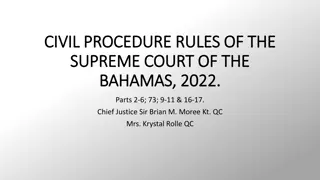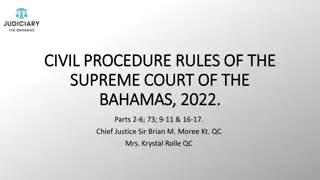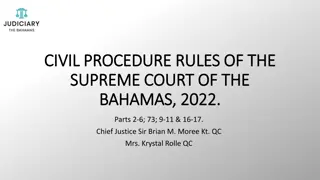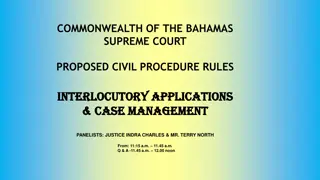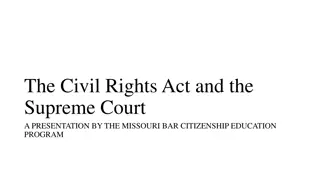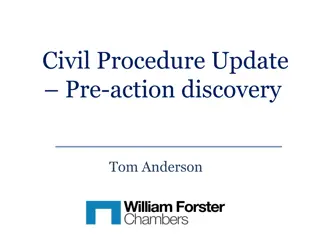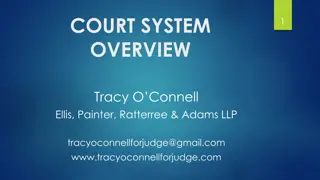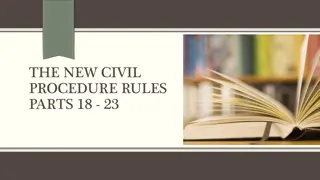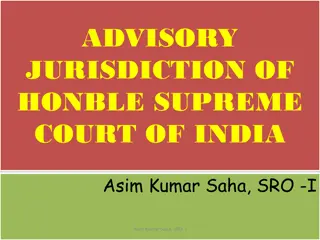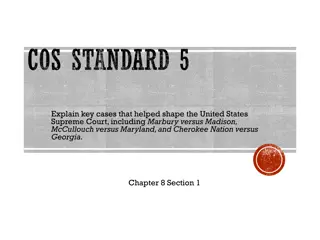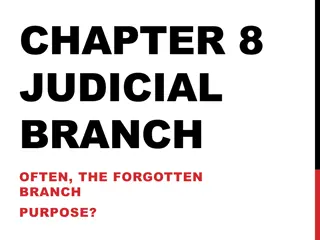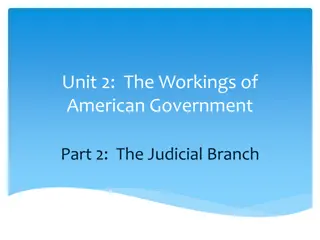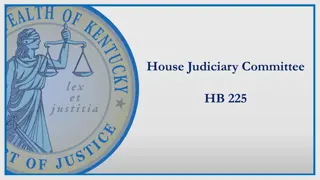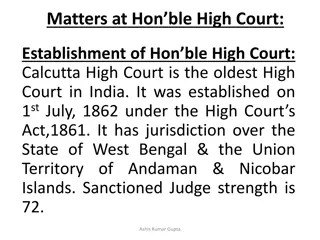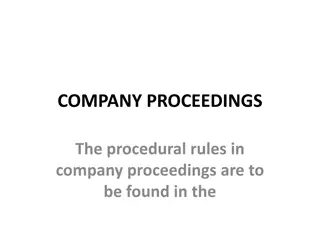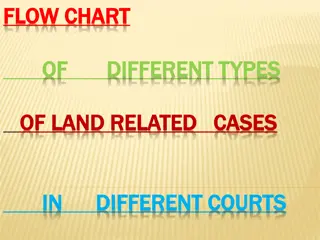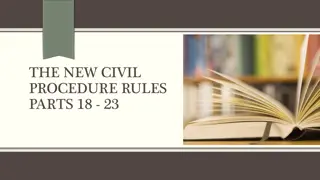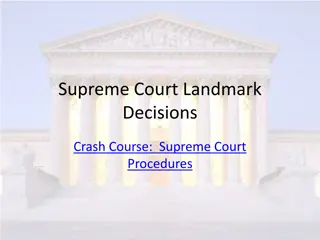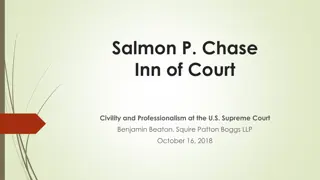Civil Procedure Rules of the Supreme Court of the Bahamas, 2022 - Acknowledgment of Service
Acknowledgment of Service is a crucial part of civil procedure in the Bahamas, where a defendant disputes a claim or the court's jurisdiction. This process involves responding within a specific timeframe, admitting or disputing parts of the claim, and providing necessary details. Failure to act within the designated period may have implications on the court's jurisdiction over the claim.
Download Presentation

Please find below an Image/Link to download the presentation.
The content on the website is provided AS IS for your information and personal use only. It may not be sold, licensed, or shared on other websites without obtaining consent from the author. Download presentation by click this link. If you encounter any issues during the download, it is possible that the publisher has removed the file from their server.
E N D
Presentation Transcript
CIVIL PROCEDURE RULES OF THE CIVIL PROCEDURE RULES OF THE SUPREME COURT OF THE SUPREME COURT OF THE BAHAMAS, 2022. BAHAMAS, 2022. Parts 2-6; 73; 9-11 & 16-17. Chief Justice Sir Brian M. Moree Kt. QC Mrs. Krystal Rolle QC
PART 9 PART 9 Acknowledgment of Service Acknowledgment of Service A defendant disputes the claim or disputes the court s jurisdiction by filing an acknowledgment of service containing a notice of intention to defend within 14 days after date of service of the claim form or other time period under CPR 9.3. If a defence is filed within that time period it is not necessary to file an Acknowledgment of Service. Notice of filing Acknowledgment of Service must be given to claimant.
PART 9 PART 9 A defendant acknowledging service - (a) may state in the acknowledgment of service that all or part of the claim is admitted; (b) must state in the acknowledgment of service the date on which the defendant received the claim form; (c) who admits all or part of a claim for a specified sum of money may file with the acknowledgment of service - (i) details of the defendant s financial circumstances; (ii) proposals for payment of any sums admitted; and (d) who admits part of the claim must state the amount admitted. - A defendant who admits part of the claim must also file a defence as to the disputed part of the claim within the time for filing a defence. -The defendant or the defendant s attorney must sign the acknowledgment of service. -The defendant must include in the acknowledgment of service an address for service within the jurisdiction to which documents may be sent.
PART 9 PART 9 Filing an Acknowledgment of Service is NOT a submission to the jurisdiction of the court. Procedure for disputing court s jurisdiction etc. (1) A defendant who disputes the court s jurisdiction to try the claim may apply to the court for a declaration to that effect. (2) A defendant who wishes to make an application under paragraph (1) must first file an acknowledgment of service. (3) An application under paragraph (1) of this rule must be made within the period for filing a defence.
PART 9 PART 9 An application challenging the jurisdiction must be supported by evidence on affidavit. A defendant who - (a) files an acknowledgment of service; and (b) does not make an application under this rule within the period for filing a defence, is treated as having accepted that the court has jurisdiction to try the claim. An order under this rule may also - (a) discharge an order made before the claim was commenced or the claim form served; (b) set aside service of the claim form; and (c) strike out a statement of claim. If on application under this rule the court does not make a declaration, it - (a) may- (i) fix a date for a case management conference; or (ii) treat the hearing of the application as a case management conference; and (b) must make an order as to the period for filing a defence.
PART 9 PART 9 Where a defendant challenges jurisdiction, the period for filing a defence is extended until the time specified in the order if the challenge is unsuccessful. Procedure for applying for a stay etc. A defendant who contends that the court should not exercise its jurisdiction in respect of any proceedings may apply to the court for a stay and a declaration to that effect after filing an acknowledgment of service. Application must be supported by an affidavit. If the application is unsuccessful, court may fix a date for a case management conference or treat the hearing of the application as a case management conference and make an order setting the time for filing a defence.
PART 10 PART 10 - - CPR CPR A defendant who wishes to defend all or part of a claim must file a defence. If (i) a claim is commenced by a fixed date claim form and there is served with that claim form an affidavit instead of a statement of claim; or (ii) any rule requires the service of an affidavit, the defendant may file an affidavit in answer instead of a defence. If a defence is not filed, a default judgment can be filed. The period for filing defence The general rule is that the period for filing a defence is the period of 28 days after the date of service of the claim form. If permission has been given under rule 8.2 for a claim form to be served without a statement of claim, the period for filing a defence is the period of 28 days after the service of the statement of claim.
PART 10 PART 10 - - CPR CPR Parties may agree to extend the period for filing a defence but there can only be two agreements to do so and in any event the maximum total extension of time that may be agreed is 56 days. The defendant must file details of such an agreement. A defendant may apply for an order extending the time for filing a defence. The defence must state which (if any) allegations in the claim form or statement of claim are admitted; are denied; and are neither admitted nor denied, because the defendant does not know whether they are true; or the defendant wishes the claimant to prove. If the defendant denies any of the allegations in the claim form or statement of claim- (a) the defendant must state the reasons for doing so; and (b) if the defendant intends to prove a different version of events from that given by the claimant, the defendant s own version must be set out in the defence. If, in relation to any allegation in the claim form or statement of claim, the defendant does not - (a) admit it; or (b) deny it and put forward a different version of events, the defendant must state the reasons for resisting the allegation.
PART 10 PART 10 - - CPR CPR The defendant must identify in or annex to the defence any document known to the defendant which is considered to be necessary to the defence. The defendant must verify the facts set out in the defence by a certificate of truth. Special requirements applying to claims for personal injuries CPR 10.6 NOTE: If the defendant intends to rely on a report from a medical practitioner to dispute any part of the claimant s claim for personal injuries and the defendant has obtained such a report, the defendant must attach that report to the defence. A claimant may file and serve a reply to a defence 14 days after the date of service of the defence or at any time with the permission of the court.
PART 11 PART 11 - - CPR CPR 11.3Applications to be dealt with at case management conference So far as is practicable all applications relating to pending proceedings must be listed for hearing at a case management conference or pre- trial review. Where an application is made which could have been dealt with at a case management conference or pre-trial review the court must order the applicant to pay the costs of the application unless there are special circumstances.
PART 11 PART 11 - - CPR CPR The general rule is that an application must be in writing. An application may be made orally if the court dispenses with the requirement for the application to be made in writing or this is permitted by a rule or practice direction. The applicant must file with the application or not less than 3 days before the hearing of the application a draft of the order sought and serve a copy on all respondents to whom notice is given. If the application is made without notice, the draft order must be attached to the application when it is filed.
PART 11 PART 11 - - CPR CPR The court may deal with an application without an oral hearing if - (a) no notice of the application is required; (b) the court does not consider that an oral hearing would be appropriate; (c) the parties agree; or (d) the parties have agreed to the terms of an order - (i) which does not vary the case management timetable; and (ii) the application (or a copy of the application) is signed by the attorney for all parties to the application. The court may, if it deems just, deal with the application over the telephone or by any other means of communication;
PART 11 PART 11 - - CPR CPR A respondent to whom notice of an application was not given may apply to the court for any order made on the application to be set aside or varied and for the application to be dealt with again. A respondent must make such an application not more than 14 days after the date on which the order was served on the respondent. A party who was not present when an order was made may apply to set aside or vary the order. The application must be made not more than 14 days after the date on which the order was served on the applicant and supported by an affidavit a good reason for failing to attend the hearing and that it is likely that had the applicant attended some other order might have been made.
PART 11 PART 11 - - CPR CPR A respondent to whom notice of an application was not given may apply to the court for any order made on the application to be set aside or varied and for the application to be dealt with again. A respondent must make such an application not more than 14 days after the date on which the order was served on the respondent. A party who was not present when an order was made may apply to set aside or vary the order. The application must be made not more than 14 days after the date on which the order was served on the applicant and supported by an affidavit a good reason for failing to attend the hearing and that it is likely that had the applicant attended some other order might have been made.
PART 16 PART 16 - - CPR CPR 16.2 Assessment of damages after default judgment An application for a default judgment in respect of a claim for an unspecified sum of money must state- (a) whether the claimant is in a position to prove the amount of the damages; and, if so (b) the claimant s estimate of the time required to deal with the assessment; or (c) that the claimant is not yet in a position to prove the amount of the damages. A claimant who is not in a position to prove damages must state the period of time that will elapse before this can be done.
PART 16 PART 16 - - CPR CPR Assessment of damages after admission of liability on claim for unspecified sum of money Where the defendant admits liability for the whole or a specified proportion of a claim for an unspecified sum of money an application for judgment to be entered for damages to be assessed on an admission must - (a) state whether the claimant is in a position to prove the amount of damages; and, if so (b) give an estimate of the time required to deal with the assessment; or (c) state that the claimant is not yet in a position to prove the amount of damages and state the period of time that will elapse before this can be done. The court will fix a period within which the assessment of damages will take place. The defendant is entitled to cross examine any witness called on behalf of the claimant and to make submissions to the court but is not entitled to call any evidence unless the defendant has filed a defence setting out the facts the defendant seeks to prove.
PART 16 PART 16 - - CPR CPR 16.4 Assessment of damages after direction for trial of issue of quantum This rule applies where the court makes a direction for the trial of an issue of quantum. The direction may be given at - (a) a case management conference; (b) the hearing of an application for summary judgment; or (c) the trial of the claim or of an issue, including the issue of liability. On giving a direction for the trial of an issue of quantum, the court must exercise the powers of a case management conference and in particular may give directions about - (a) disclosure; (b) service of witness statements; and (c) service of expert reports. The court must fix a period within which the assessment of damages is to commence.


